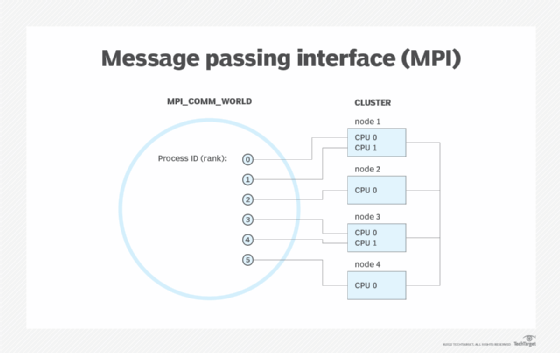message passing interface (MPI)
What is the message passing interface (MPI)?
The message passing interface (MPI) is a standardized means of exchanging messages between multiple computers running a parallel program across distributed memory.
In parallel computing, multiple computers – or even multiple processor cores within the same computer – are called nodes. Each node in the parallel arrangement typically works on a portion of the overall computing problem. The challenge then is to synchronize the actions of each parallel node, exchange data between nodes, and provide command and control over the entire parallel cluster. The message passing interface defines a standard suite of functions for these tasks. The term message passing itself typically refers to the sending of a message to an object, parallel process, subroutine, function or thread, which is then used to start another process.
MPI isn't endorsed as an official standard by any standards organization, such as the Institute of Electrical and Electronics Engineers (IEEE) or the International Organization for Standardization (ISO), but it's generally considered to be the industry standard, and it forms the basis for most communication interfaces adopted by parallel computing programmers. Various implementations of MPI have been created by developers as well.
MPI defines useful syntax for routines and libraries in programming languages including Fortran, C, C++ and Java.
Benefits of the message passing interface
The message passing interface provides the following benefits:
- Standardization. MPI has replaced other message passing libraries, becoming a generally accepted industry standard.
- Developed by a broad committee. Although MPI may not be an official standard, it's still a general standard created by a committee of vendors, implementors and users.
- Portability. MPI has been implemented for many distributed memory architectures, meaning users don't need to modify source code when porting applications over to different platforms that are supported by the MPI standard.
- Speed. Implementation is typically optimized for the hardware the MPI runs on. Vendor implementations may also be optimized for native hardware features.
- Functionality. MPI is designed for high performance on massively parallel machines and clusters. The basic MPI-1 implementation has more than 100 defined routines.
Some organizations are also able to offload MPI to make their programming models and libraries faster.
MPI terminology: Key concepts and commands
The following list includes some basic key MPI concepts and commands:
- Comm. These are communicator objects that connect groups of processes in MPI. Communicator commands give a contained process an independent identifier, arranging it as an ordered topology. For example, a command for a base communicator includes MPI_COMM_WORLD.
- Color. This assigns a color to a process, and all processes with the same color are located in the same communicator. A command related to color includes MPE_Make_color_array, which changes the available colors.
- Key. The rank or order of a process in the communicator is based on a key. If two processes are given the same key, the order is based on the process's rank in the communicator.
- Newcomm. This is a command for creating a new communicator. MPI_COMM_DUP is an example command to create a duplicate of a comm with the same fixed attributes.
- Derived data types. MPI functions need a specification to what type of data is sent between processes. MPI_INT, MPI_CHAR and MPI_DOUBLE aid in predefining the constants.
- Point-to-point. This sends a message between two specific processes. MPI_Send and MPI_Recv are two common blocking methods for point-to-point messages. Blocking refers to having the sending and receiving processes wait until a complete message has been correctly sent and received to send and complete a message.
- Collective basics. These are collective functions that need communication among all processes in a process group. MPI_Bcast is an example of such, which sends data from one node to all processes in a process group.
- One-sided. This term is typically used referring to a form of communications operations, including MPI_Put, MPI_Get and MPI_Accumulate. They refer specifically to being a writing to memory, reading from memory and reducing operation on the same memory across tasks.

History and versions of MPI
A small group of researchers in Austria began discussing the concept of a message passing interface in 1991. A Workshop on Standards for Message Passing in a Distributed Memory Environment, sponsored by the Center for Research on Parallel Computing, was held a year later in Williamsburg, Va. A working group was established to create the standardization process.
In November 1992, a draft for MPI-1 was created and in 1993 the standard was presented at the Supercomputing '93 conference. With additional feedback and changes, MPI version 1.0 was released in 1994. Since then, MPI has been open to all members of the high-performance computing community, including more than 40 participating organizations.
The older MPI 1.3 standard, dubbed MPI-1, provides over 115 functions. The later MPI 2.2 standard, or MPI-2, offers over 500 functions and is largely backward compatible with MPI-1. However, not all MPI libraries provide a full implementation of MPI-2. MPI-2 included new parallel I/O, dynamic process management as well as remote memory operations. The MPI-3 standard released in November 2014 improves scalability, enhances performance, includes multicore and cluster support and interoperates with more applications. In 2021, The MPI Forum released MPI 4.0. It introduced partitioned communications, a new tool interface, Persistent Collectives and other new additions. MPI 5.0 is currently under development.
Learn about 12 other commonly used IoT standards in this article.






